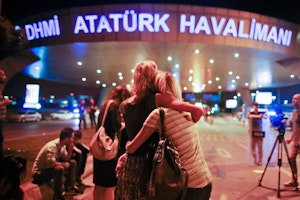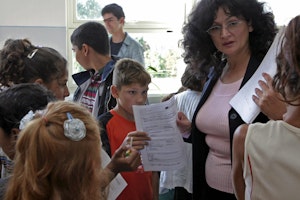Peace May Come to Turkey, but Justice There Remains a Paradox
By Chris Stone
Two years ago, I could not have dreamed that peace between the Turkish government and the PKK would be possible in my lifetime. On a recent visit to Istanbul, I said as much to Hakan Altinay, the chair of the Open Society Foundation–Turkey. He replied, “Two months ago, even your friends in Turkey could not dream of such a thing.” And yet today, the government of Prime Minister Recep Tayyip Erdogan, through the national intelligence unit MIT, is engaged in serious, multiparty peace talks with the PKK and its jailed leader, Abdullah Ocalan.
The peace talks are reminiscent of the British government’s talks with the outlawed IRA and the South African National Party’s talks with the outlawed ANC, but both of those took place before the United States declared a global war on terrorism. The PKK, the Kurdish Workers’ Party, is designated as a terrorist organization by Turkey, the EU, and the U.S., and Ocalan is often referred to as Turkey’s Chief Terrorist. Ocalan is serving a life sentence in an island prison off Istanbul, and it is here in this extraordinary setting—a place of exile for Ottoman princes, a refuge for Leon Trotsky, and the scene of the execution of Turkey’s prime minister after the coup of 1960—that peace talks are now getting underway.
What is most surprising, Hakan Altinay told me, is not Erdogan’s openness to peace negotiations with terrorists, but the country’s openness. The openness was there, just below the surface, but we did not see it. When you simply extrapolate from the past, Hakan continued, it is easy to misjudge the future. “We’ve been mugged so many times on the path towards peace, that many of us had simply stopped venturing out,” Hakan explained. But with 40,000 lives lost in years of fighting, it seems that the people of Turkey are ready for peace and Erdogan is making the road safe.
The peace talks, though only a few weeks old, are already heralding wider and welcome changes to Turkey’s justice system. In an interview in early February, Erdogan answered a reporter’s question about pretrial detention that began about the generals in detention, but which Erdogan widened to apply to all prisoners: “They [the judges] need to act much more sensitively on this issue. Pretrial detention should be used as a measure of last resort.... I am speaking in general for all detainees pending trial,” and similar statements followed days later from the Speaker of the Grand Assembly.
Turkey’s criminal procedure code permits those accused of serious crimes to be held in pretrial detention for up to four years, but in cases of national security detention can continue without trial for ten. Thousands of Kurdish prisoners are being held without trial under those provisions, and Erdogan’s statement may be preparing the country for their release. But many more people—numbering in the tens of thousands—are held in pretrial detention for ordinary crimes. While human rights advocates sometimes ignore those charged with ordinary crimes, the further actions that Erdogan may propose could enlarge justice for them as well.
My own interest in Turkey is grounded in the policing, prosecution, and adjudication of these ordinary crimes. For nearly a decade before joining the Open Society Foundations, along with colleagues at Harvard’s Kennedy School of Government, I was following the welcome revisions that Erdogan and the AKP (the Justice and Development Party) had made to the code of criminal procedure in 2004—revisions that enhanced the effects of a decade of significant reforms to the Turkish National Police (TNP). Since then, however, a series of judicial reforms and a constitutional referendum have complicated the legal picture, and the jailing of journalists and politicians have blackened the reputation of Erdogan’s government among all concerned with human rights.
The result is that Turkey in recent years has presented a stark paradox in the quality of justice. Police reforms and new rules of evidence have virtually eliminated torture in TNP interrogations along with much police corruption. Poor people accused of serious crimes enjoy some of the strongest rights to legal representation anywhere in the world, and victims of serious crimes similarly receive free legal assistance through innovative legal provisions that should be international models. The 2004 legal provisions governing pretrial detention were intended to reduce the frequency of prolonged detention, at least for ordinary crimes, and protections against unreasonable searches and seizures are—at least in law—some of the strongest in the world.
Yet, at the same time, Turkey’s prison population has grown to unprecedented levels, while prosecutors in the special courts that handle terrorism and other cases that implicate national security have jailed journalists and politicians in great numbers. The fear of criminal prosecution and prolonged detention has squelched robust political debate and even straightforward discussion of politics. It is not uncommon when discussing political questions for prominent Turkish citizens to remove the batteries from their mobile phones, on the assumption that the microphones in their devices are being activated remotely by security services routinely monitoring millions of innocent conversations.
Perhaps peace between Turkey and the PKK not only can give Kurdish communities a degree of local autonomy, but can resolve the paradox that compromises Turkey’s otherwise admirable justice sector reforms. It would be heartening if Erdogan and Turkey could do what Obama and the U.S. government seem unable to do: free themselves from the legacy of cruelties and abuses committed in the name of national security, allowing the world to see their genuine commitments to justice—commitments that presently remain sequestered in remote, undisclosed locations within their souls.
Until December 2017, Chris Stone was president of the Open Society Foundations.

